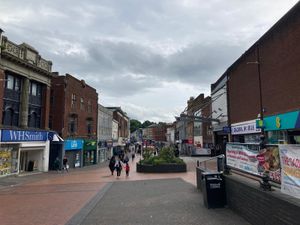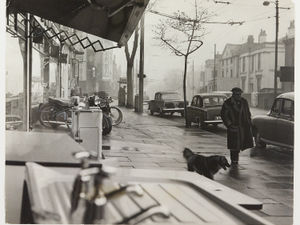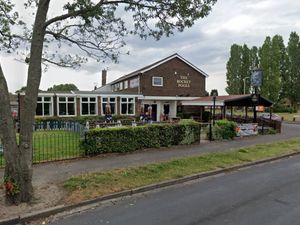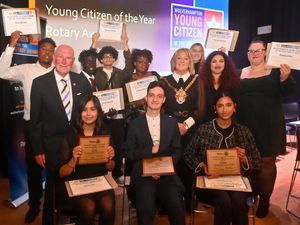The life and times of Dennis Turner, a 'mon' of the people
With banners waving and hundreds of people urging their fellow voters to back w'your local Labour mon', it is hard to imagine another politician more deserving of the title 'man of the people' than Dennis Turner.
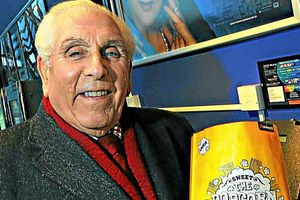
Even when elevated to the House of Lords, he took the town of his birth as his name, Baron Bilston.
And when he served as MP for Wolverhampton South East around 300 people took to the streets at the end of his first term of office to campaign for his re-election.
The crusade succeeded, with the number of votes for Dennis Turner in 1992 was almost double those of his Conservative rival.
Fast forward 22 years and it would be unthinkable, in the post-expenses scandal 'they're all the same' cynicism of 2014 that any MP would have such a strong following.
But Dennis Turner, honoured last year with a Famous Sons and Daughters of Wolverhampton award, was from a different era, when more working class people were chosen by their communities to represent them in Westminster. He was an extremely well-liked politician, for whom successive Express & Star lobby reporters based in the House of Commons developed a fondness and friendship.
He was born, raised and educated in Bradley. And he lived there all his life.
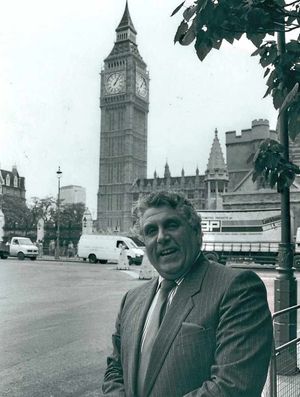
Although the first time the young Dennis stood up for what he believed in, he was not even in his teens.
As a six-year-old he had joined St Martin's Church choir. By the age of 12 he was leading the choir out on strike in a row over their one-shilling wages for each wedding.
Dennis picked the busiest time of year to strike. The vicar soon agreed to double their pay and the choir was back in full voice.
He knew how to rally his community to a cause he believed in, and which he believed would benefit them too.
He was educated at St Martin's C of E School, in Slater Street, then at Stonefield Secondary (later Hall Green Comprehensive, then Bilston High School and now South Wolverhampton and Bilston Academy), in Prosser Street.
He left to work at Thomas Perry steel roll makers, in Highfields Road, as an office boy making tea and doing chores, then studied office accounting at Bilston College before joining the Betterware kitchen equipment company as a salesman when he was 17.
He recently remarked how there were people who would stop him and tell him they still owned something he had once sold them.
Going door to door in the 1950s and 1960s, and seeing the poor conditions of slum housing, gave Lord Bilston the interest he would have in politics for the rest of his life and the belief that he could help to make things better.
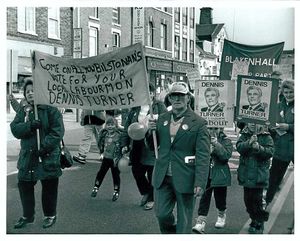
And two years later, he was first elected to the Wolverhampton Borough Council at the age of 22.
His years in local government included chairing its social services, special education, further education, housing services and the committee overseeing the beloved Grand Theatre.
He was chosen to be the deputy leader of the council in 1980, a position he held for six years until his decision to stand for Parliament. Lord Bilston also served on the now-defunct West Midlands County Council from 1973 until 1986.
He was already well-known in Bilston outside of his political work.
Dennis Turner chaired the Joint Trade Union Action Committee which had fought the long and ultimately doomed battle to stop the closure of Bilston Steelworks.
He was at the forefront of the five-year fight to save the works from the axe in the late 1970s, and was devastated when it closed with the loss of thousands of jobs.
"It was traumatic to see the demise of the steel industry," he once recalled.
"I don't think I will ever see such a catastrophic effect on the people of this area.
"I was chairman of the committee which represented all the plant unions, fighting for three years to save the steelworks.
"The decision to close the place should have been challenged in Parliament, but wasn't. We had a good case but no-one would listen to us because the people at the top of the corporation were not accountable, and 2,400 jobs were lost.
"Yes we lost the fight, but the workers got a tremendous insight into the way the steel industry was against the workers.
"The fight taught these people, and myself, that we have to fight against these policies that are against the working man.
"But we must put that behind us now, learn the lessons, and start to change things for the sake of the people of Bilston.
"There were many problems, but local people have belief in themselves which comes from their Black Country breeding.
"Just think what could happen if many people contributed just a small amount of time, effort and care – what a power that would be."
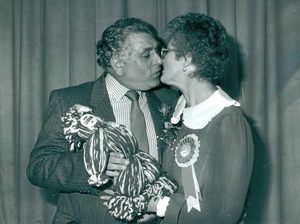
As a Wolverhampton councillor at the time he was given a China piggy bank by Conservative Paddy Bradley when he resigned his seat to begin his campaign.
He continued to fight hard for his people. In 1993 he gathered 5,000 signatures on two petitions, 2,500 on each, campaigning against plans to impose VAT on fuel and another against threatens to strip pensioners of free travel passes.
On the latter, Dennis Turner was certainly on the right side of history.
Not only were bus passes preserved but they were eventually beefed up to allow pensioners to use them wherever they were in the country. A recent, cuts-driven threat to strip them of the extra tram and train travel they enjoy in the West Midlands has been scrapped. The significance of the petition cannot be underestimated. This was an age before almost everyone had access to the internet and long before people could just sign a petition by clicking a link shared on Twitter.
He also never lost touch with the concerns of the people who elected him, even after he was made a Lord.
In 1998 he led a campaign to persuade the pub industry to adopt over-sized lined glasses so that beer drinkers could get the full 20 fluid ounces they had paid for with the head on top.
Lord Bilston also chaired the Wolverhampton Fairtrade Partnership, which worked to make sure poor people across the world involved in the growing and production of food were given a decent living. And although he had lost the battle over the steelworks, he did manage to lead the group that saved the site's sports and social club, Spring Vale, in Millfields Road.
It is still used by community groups and Lord Bilston would regularly go there to enjoy a pint of his Banks's – with the right amount beer under the head, of course.
Just a few years ago his time and power was called upon again when Bilston itself looked to be bureaucratically torn apart in a review of Parliamentary boundaries.
The town was set to be represented by four different MPs, something that risked its very identity.
Dennis Turner, along with his brother Bert, a councillor and at the time mayor of Wolverhampton, led the charge.
They took a coachload of people to a Boundary Commission hearing in Birmingham to plead their case. And they won.
The stroke he suffered in May 2006 affected the use of his right arm and leg, but he recovered and carried on his duties in the Lords. The following year he was granted Freedom of the City.
It was the highest civic honour which meant that Lord Bilston could, whould he so wish. graze his sheep in St Peter's Square or set up an unregulated business.
He served as an Opposition Whip from 1992 until 1997 when he was appointed parliamentary private secretary to the then international development secretary Clare Short.
Dennis Turner would later stand down from that role in 2003 alongside Miss Short, who quit her post in protest at the Iraq war.
At the time, he said it was 'crucially important' that the UK secured a resolution from the United Nations backing military intervention. In the end, Prime Minister Tony Blair proceeded without it. As an MP, Lord Bilston founded and chaired the All-Party Parliamentary Group for Further Education and was Chairman of the House of Commons Catering Committee from 1997 until 2005.
He was also closely involved in the major campaign to achieve City Status for Wolverhampton.
But despite his huge political profile he was a family man at heart. He leaves his devoted wife Pat, 67, two grown up children, Brendon and Jenny, and a granddaughter, Bella.
Last year, the old Labour firebrand Dennis Skinner highlighted Dennis Turner as the sort of person that voters just do not see enter politics anymore.
Dennis Turner lived in Bradley from the day he was born.
That 'local Labour mon' might well have been elevated to become a peer of the realm. But he never forgot where he was from.


